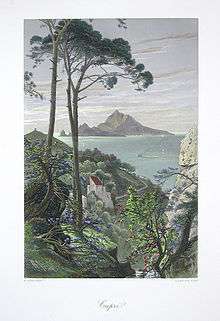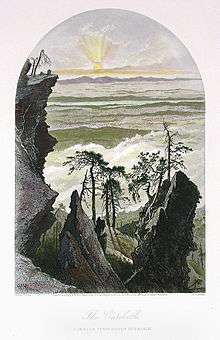Harry Fenn

Harry Fenn (1837 – April 22, 1911) was an English-born American illustrator, landscape painter, etcher, and wood engraver. From 1870 to around 1895 he was the most prominent landscape illustrator in the United States.[1]
Biography
Fenn was born at Richmond, near London, England.[2]
Fenn started as a wood engraver, apprenticing with the Dalziel firm in London, but soon turned to drawing for illustration and watercolor painting. In 1857 he made a trip to the U.S. to see the Niagara Falls and settled in New York where he worked first as a wood engraver. In 1862 he married Marian Thompson of Brooklyn. After an extended wedding trip to England and Italy, where Fenn studied painting, his focused on illustration in New York.[3]
He settled in Montclair, New Jersey, around 1865. His first highly successful commission was to illustrate Whittier's Snow-Bound published by Boston's Ticknor and Fields in 1867 for the Christmas trade (dated 1868). Its tiny images apparently opened the eyes of many to the artistic possibilities of wood engravings, and it is often referred to as the "first gift book published in America," although it had predecessors.[4] Fenn is best known for the engravings he contributed with his friend Douglas Woodward to three massive books filled with wood and steel engravings that were published by New York's D. Appleton and Co.: Picturesque America (1872–74),[5][6] edited by William Cullen Bryant, which started as a serial in Appleton's Journal in 1870;[7] Picturesque Europe (1875–79), and Picturesque Palestine, Sinai and Egypt (1881–84). Other artists contributed to each of these books, but Fenn was the most prolific contributor, and his innovative page designs combining image and text popularized this approach. Fenn and his family lived in England from 1873 to 1881 while Fenn worked on Picturesque Europe and Picturesque Palestine.[8]
After returning to the U.S. in 1881, Fenn was a sought-after illustrator for the leading illustrator periodicals, Century Magazine, "Harper's Monthly," "Harper's Weekly," and Scribner's. He was commissioned to illustrate landscape throughout the world and the U.S. as well as to produce depictions of architecture and plant life. As the technologies for printing illustrations changed, Fenn adapted, producing ink drawings for reproduction as process line cuts and later watercolors for reproduction as halftones. He also contributed to numerous books of poetry. An edition of Gray's Elegy in a Country Churchyard published by Roberts Brothers in 1884 was stamped "Harry Fenn Edition" on the front cover. He was also the sole illustrator of an edition of Tennyson's "In Memoriam", published by Fords, Howard and Hulbert in 1897, in a very different style from his earlier designs for poetry.[9]
Throughout his career Fenn prepared watercolors for exhibition and sale. He was among the founding members of the American Watercolor Society, attending the second meeting in 1867, and he regularly participated in their exhibitions. He was a member of the New York Watercolor Club, the Society of Illustrators, and the Salmagundi Club. He exhibited at the National Academy of Design in 1864 and at the Brooklyn Art Association between 1864 and 1885. He exhibited at the Centennial Exposition in Philadelphia in 1876 and at the Columbian Exposition in Chicago in 1893, where he was awarded a medal. Fenn died on April 22, 1911, at his home in Montclair, where he had lived since 1881.[2][10]
Fenn's works reached a wide audience and popularized publications with illustrations, expanding the field for other artists. As Sue Rainey wrote in her book Creating a World on Paper: Harry Fenn's Career in Art: "Fenn's dynamic and appealing compositions set a high standard. They built pride in America's scenic landscapes and urban centers, informed a curious, increasingly cosmopolitan public about foreign lands, and fostered an appreciation of printed pictures as artworks accessible to a growing middle class" (p. 1).
References
Citations
- ↑ Sue Rainey, Creating a World on Paper: Harry Fenn's Career in Art (University of Massachusetts Press, 2013), 5-6.
- 1 2 "Harry Fenn, Artist, Dead in 73rd Year". New York Times. April 23, 1911. Retrieved March 10, 2015.
- ↑ Rainey, 14-20.
- ↑ Rainey, 32-37.
- ↑ Pict. Amer. (1872).
- ↑ Pict. Amer. (1874).
- ↑ See Sue Rainey, "Creating Picturesque America: Monument to the Natural and Cultural Landscape", Vanderbilt University Press, 1994.
- ↑ Rainey, "Creating a World on Paper," Chap. 4.
- ↑ See Rainey, 'Creating a World on Paper," Chaps. 5 and 6.
- ↑ American Art Annual, Volume 9. MacMillan Company. 1911. p. 311.
Bibliography
- Picturesque America; or, The Land We Live In. A Delineation by Pen and Pencil of the Mountains, Rivers, Lakes, Forests, Water-falls, Shores, Cañons, Valleys, Cities, and Other Picturesque Features of Our Country. With Illustrations on Steel and Wood, by Eminent American Artists, Vol. I, New York: D. Appleton & Co., 1872.
- Picturesque America; or, The Land We Live In. A Delineation by Pen and Pencil of the Mountains, Rivers, Lakes, Forests, Water-falls, Shores, Cañons, Valleys, Cities, and Other Picturesque Features of Our Country. With Illustrations on Steel and Wood, by Eminent American Artists, Vol. II, New York: D. Appleton & Co., 1874.
- Picturesque Europe: A Delineation by Pen and Pencil of the Natural Features and the Picturesque and Historical Places of Great Britain and the Continent. Illustrated on Steel and Wood by European and American Artists, Vol. I, New York: D. Appleton & Co., 1875.
- Picturesque Europe: A Delineation by Pen and Pencil of the Natural Features and the Picturesque and Historical Places of Great Britain and the Continent. Illustrated on Steel and Wood by European and American Artists, Vol. II, New York: D. Appleton & Co., 1878.
- Picturesque Europe: A Delineation by Pen and Pencil of the Natural Features and the Picturesque and Historical Places of Great Britain and the Continent. Illustrated on Steel and Wood by European and American Artists, Vol. III, New York: D. Appleton & Co., 1879.
- Picturesque Palestine, Sinai, and Egypt, Div. I, New York: D. Appleton & Co., 1881.
- Picturesque Palestine, Sinai, and Egypt, Div. II, New York: D. Appleton & Co., 1881.
- Picturesque Palestine, Sinai, and Egypt, Div. III, New York: D. Appleton & Co., 1881.
- Picturesque Palestine, Sinai, and Egypt, Div. IV, New York: D. Appleton & Co., 1883.
- Basbanes, Nicholas A. (2002). Among the Gently Mad: Perspectives and Strategies for the Book Hunter in the Twenty-First Century. Henry Holt & Co. p. 125. ISBN 0-8050-5159-7.
- Rainey, Sue (2013). Creating a World on Paper: Harry Fenn's Career in Art. Amherst and Boston: University of Massachusetts Press. p. 392. ISBN 978-1-55849-979-9.
- Rainey, Sue (1994). Creating Picturesque America: Monument to the Natural and Cultural Landscape. Nashville: Vanderbilt University Press. p. 383. ISBN 1-55709-534-5.
- Rainey, Sue (1998). "Harry Fenn". Dictionary of Literary Biography. 188. Detroit, Washington, D.C. , London: Gale Research. pp. 95–104.
- Rainey, Sue (2005). "Illustration "Urgently Required": The Picturesque Palestine Project, 1878-83". Prospects: An Annual of American Cultural Studies. 30: 181–260.
- Shepard, Elizabeth; Royal F. Shepard (2003). Montclair. Arcadia Publishing. p. 45. ISBN 0-7385-1349-0.
External links
| Wikimedia Commons has media related to Harry Fenn. |
- Works by Harry Fenn at Project Gutenberg
- Works by or about Harry Fenn at Internet Archive
- Harry Fenn: Pen and Ink Virtuoso
- https://archive.org/details/cihm_25270/ Picturesque America
- http://www.umass.edu/umpress/title/creating-world-paper/Publisher's information on book
